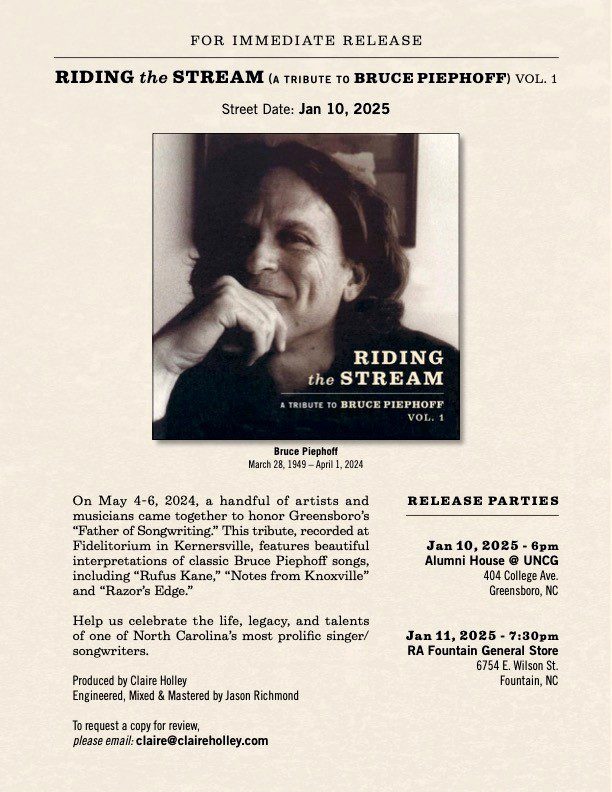ALBUM REVIEW: Bruce Piephoff Tribute Champions Street Poet’s Songs and Legacy

Bruce Piephoff was a street poet with the soul of a fallen angel. Piephoff’s body of work chronicled migrants, the dispossessed, the downtrodden, and rootless wanderers who just chose to roam endlessly. Piephoff, who passed away in April of last year, was honored by his hometown of Greensboro, N.C. which named him “The Father of Songwriting.” The singer/songwriter label stuck to him, but Piephoff’s output contained some country flavorings as well, with songs like “Sawbriar,” and “Twenty Miles To Baghdad.” Now a tribute album, produced and organized by Claire Holley, who sings lead harmony and provides acoustic guitar on many of the tracks, aims to further honor his musical legacy.
Piephoff had gone to Nashville early in his career, but couldn’t make any headway in Music City. After getting married and having a son, Piephoff cut short his rambling troubadour days. “When I got to my forties, I said, ‘Man, I’m just sick of trying to make it, all this stuff, I think I’m just going to try to focus on my work.’ I just want to try to write good songs,” Piephoff told this reviewer in a previous interview for the Greensboro News and Record. He achieved that goal. Piephoff put out 25 albums and two books of poetry and worked in the Visiting Artist programs in North Carolina, Virginia, and Florida.
Fred Chappell, who was Poet Laureate of North Carolina from 1997 to 2002, and professor at UNC-Greensboro for 40 years, had Piephoff as an MFA student in creative writing. As he put it in a previous interview for the Greensboro News and Record, Piephoff was not a folk poet, but a poet of the folk: “using material or the lives of workers and poor people, people all across the spectrum of our society. And gives voice to all their concerns and does it in a way that’s pungent and elegant at the same time.”
That pungent elegance is displayed magnificently on Holley’s tribute. “Hambone,” a traditional African American song that has been taken on by a slew of artists, including the Georgia Sea Island Singers, as well as John Dee Holeman and Dom Flemons, who provided the sound effects by slapping their chests and thighs in rhythm. Holley’s Appalachian-tinged vocals wander a path between Rickie Lee Jones and Lucinda Williams. Piephoff’s version also includes a shout out to Algia Mae Hinton who he imagines performing it on guitar with an accompanying buck dance.
The most striking thing about this tribute is how pretty it is. Piephoff’s often rough-hewn lyrics rest on a comfortable sound pillow courtesy of singer/guitarist Sam Frazier’s six and twelve-string guitar and various local cohorts who are either current or past band members, including bassist Chris Micca and drummer Cliff Greeson.
“Rufus Caine” is a prayer for a wandering soul. Frazier pleads for a stranger who walks once more like a child, lost in wonder at his surrounding. David Childers voices the plight of migrant workers on “Riding the Stream,” buoyed by Scott Sawyer’s bluesy guitar licks: “We dream of a better life for our kids/We dream of the fields and all the work we did/Dream of success, the American dream/But meanwhile we’re treading water on the East Coast stream.” And Martha Basset leads on “A Sight To Behold,” an ode to the simple pleasures of observing the beauty of an early morning through the Nantahala Gorge: “Aches and fears all drift away/ Feelin’ no pain on this sunny day/Makes me think there might just be a way/It’s a sight to behold.”
Piephoff’s legacy lives on through his music and the voices that remember him with love and reverence. It is indeed a sight to behold, and hopefully there will be more to come.
Riding The Stream: A Tribute to Bruce Piephoff Vol 1 released on Jan. 10 via Olivia’s Attic Music.


